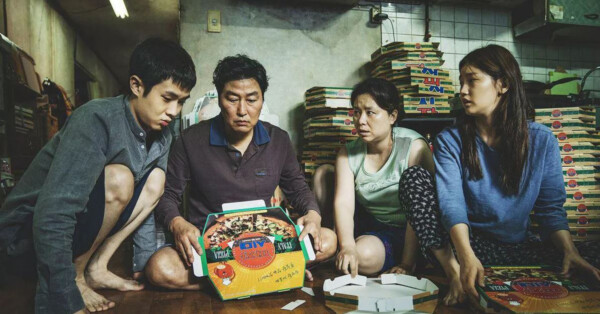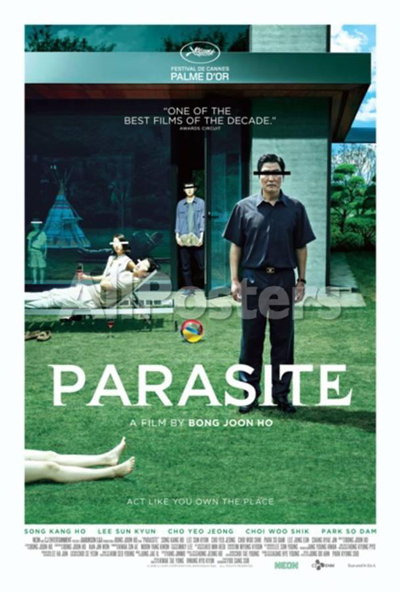Del and Mladen review ‘Parasite’

Image courtesy of CJ Entertainment.
“Parasite” Starring Song Kang-ho, Jang Hye-jin, Choi Woo-shik, Park So-dam, Cho Yeo-jeong, Lee Sun-gyun and others. Directed by Bong Joon-ho. 2 hours, 12 minutes. Rated R. Hulu, Amazon Prime.
Del’s take
Maybe it’s a sign of the times that for two years running a movie about class structure has won the Academy Award for Best Picture, or maybe it’s just a reward for classy moviemaking. No matter. “Parasite,” the 2019 Best Picture winner, earns that accolade and then some with its darkly hilarious and stingingly critical look at the way money makes monsters of us all.
In the past, South Korean director Bong Joon-ho used fantasy elements to illustrate the dehumanizing aspects of Western – and now Eastern – culture and its fixation on accumulating wealth at the expense of the planet and its people, but in “Parasite” he brings the argument closer to home with ordinary folks, in this case the Kim family, jumping through extraordinary hoops to escape their poverty and maybe even climb the lower rungs of the ladder to success.
The Kims – father Ki-Taek, mother Chung-sook, sister Ki-jung and brother Ki-Woo – are living in a semi-subterranean roach trap where they fold pizza boxes to earn a living, open their windows when the fumigator comes down their alleyway, and wile away the hours dreaming up scams so they may, in the words of the “Good Times” TV show theme song, begin “movin’ on up to the big time.” An opportunity finally comes their way when Brother Ki-Woo connects with a friend who recommends him for a private teaching job. The wealthy Park family needs a new tutor for their teenaged daughter, and before the movie has finished they will also need a new driver, housekeeper and art therapy teacher for their son – all provided by the Kim family after a bit of slyly funny subterfuge, disinformation and Machiavellian maneuvering.
But karma catches up with the Kims and their machinations pile up like logs stuck in a flume. At that point “Parasite” takes a left turn from a “I Love Lucy”-style farce about a family of ne’er-do-wells creating their own misfortune to a razor-sharp satire about the inequalities of class and how those inequalities can drive some people to madness.
“Parasite” is perfectly acted and written, and I would rate it one of the finest black humor stories ever set to film – up there with “Dr. Strangelove” and “Being There.” It delivers many of its lessons through dialogue. In one scene, the wealthy Parks are having what they think is a private conversation about Mr. Kim and his odor – he smells like old radishes, or the people who ride the subway, Mr. Park muses, to which Mrs. Park replies that she hasn’t ridden the subway in ages. In another scene young Ki-Woo is asking his father if he has a plan for dealing with their latest predicament and the elder Kim replies that indeed he does have a plan, and it is the best plan of all, which is to have no plan because plans fail and leave the planner disappointed and fearful.
As the movie progresses along the trajectory of its increasingly bizarre resolution it becomes impossible not to watch and remains with the viewer long after the closing credits roll. Suffice it to say the Kims might yet climb out of their below-ground-level living conditions but not in the way they planned. Remember: The best plan is to not have a plan.
It took me the first third of the movie to become invested in “Parasite” but once I did I became a huge fan. I think it’s one of the best movies made this century and I will add it to my DVD collection. It’s on Hulu for subscribers, or you can watch it pay-per-view on Amazon Prime.
I give it an A+.

Mladen’s take
Del gives “Parasite” an A+. I give it an A-. The bout of graphic violence at the end distracts the movie. It’s not that the violence is unwarranted. It’s that it should’ve been done with more finesse and less blood.
Del, who’s ordinarily good at summing a movie, misfired on this one. “Parasite” is about both class warfare in the traditional sense – the wealthy pissing on the poor – and interclass warfare between the considerably less well off. To me, that was the movie’s strongest component and lead to its funniest, most satirical scene.
The Kim’s infiltrate the wealthy Park family by shitting on others who are poor or one lost job from tumbling into poordom. One of the Kim shat-upons is the Park’s housekeeper. The Kims connive a way to get her fired so that Mama Kim can take over as the maid. One event leads to another and pretty soon the fired housekeeper and her husband are threatening to expose the Kim con on social media by pressing the “send” button on a cell phone. The kerfuffle that comes along is a hoot. The Kims and the housekeeper (six people) fight up bomb shelter stairs and in a sprawling living room with cell phone imagery and its distribution on the World Wide Web as the prize.
“Parasite” is director Bong Joon-ho at nearly his finest. I’ve watched four of his films. “Snowpiercer” is superb. “Parasite,” along with “The Host” and “Okja” are merely excellent. But they all share a backbone: Mankind is deranged.
Obviously, Bong isn’t the only filmmaker to tackle social injustice. From 1927’s “Metropolis” to 2020’s “Nomadland” the ugliness of our species is well notated. The important part about the message in “Parasite” is that it shows snobbery, greed, selfishness, and disillusionment are the globe’s real currencies. South Korea’s won, the euro, America’s dollar, Brazil’s real, and whatever the fuck Bitcoin is, are just tools that magnify humanity’s flawed, odious character.
I watched “Parasite” with some pleasure. It reinforced what I’ve long known and witnessed almost daily as a newspaper reporter. We the people know what’s going wrong with society. We know what it would take to correct the errors of homelessness, hunger, and medical care rationing based on access to wealth. But we ain’t gonna do nothing about them.
I don’t know. Maybe it’s time that I stop watching films with dire portent or those that feature potent dissection of social ills. Maybe it’s time that I re-watch “E.T. The Extraterrestrial,” “The Princess Bride,” and “The NeverEnding Story” and then stop watching movies all together because they seem to be ever more disturbingly prophetic.
Mladen Rudman is a former journalist and technical writer. Del Stone Jr. is a former journalist and author.
![]()
Leave a Reply